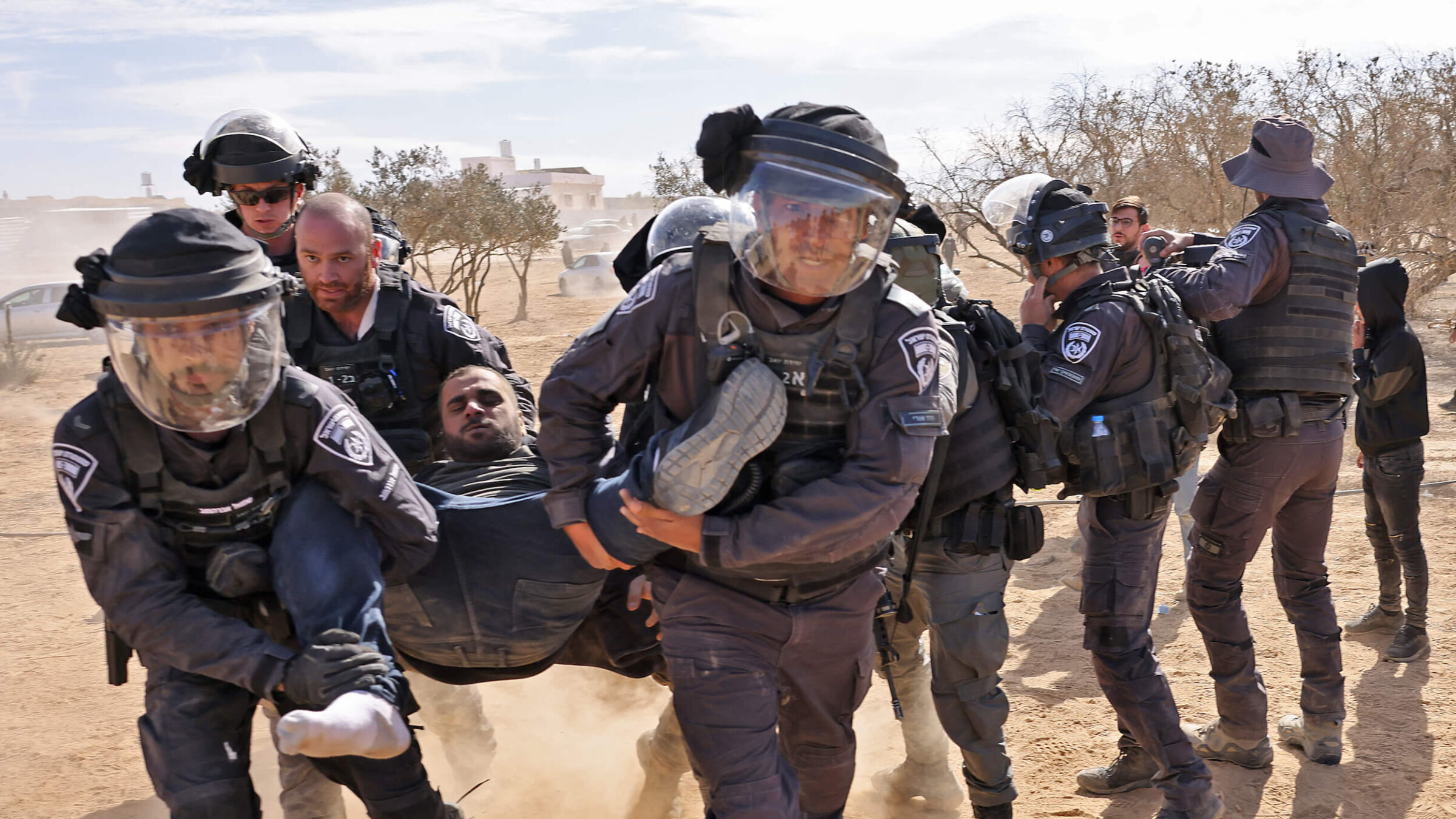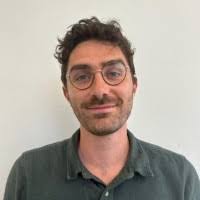It’s tradition to plant trees in Israel for Tu B’Shvat. That custom has a dark history
A beloved Hebrew school ritual is contributing to displacement and unrest in the Middle East

Israeli police detain a man as Bedouins protest against a forestation project by the Jewish National Fund in the southern Israeli village of Sa’we al-Atrash in the Neguev Desert on Jan. 12, 2022. Photo by Ahmad Gharabli/AFP
When I was a child in Hebrew school in the early 2000s, and our teachers would offer us the opportunity to “plant a tree in Israel” on Tu B’Shvat, I was thrilled. However, I had no idea where that tree would actually go, or what the organization that planted it, the Keren Kayemet LeYisrael-Jewish National Fund, was really trying to accomplish. I don’t think my teachers or parents did either. We simply believed that donating to KKL-JNF was right and good; it was what Jewish people did.
After all, what about “making the desert bloom” in honor of an ecologically minded holiday — and supporting the flourishing of our fellow Jews in Israel — could be problematic?
It turns out, a lot. KKL-JNF, which is distinct from JNF-USA, built its philanthropic profile on the promise that, together, we were planting a peaceful future for the Jewish people. But even though the notion of “planting a tree in Israel” may sound wholesome, KKL-JNF’s Israeli forestation efforts have often been guided by an aggressive political intent, with ill effects for Israeli Jews and Palestinians alike.
Since the organization’s inception in 1904, JNF Israel, which merged with Keren Kayemet LeYisrael in 1953, has been a major player in Israeli land acquisition. Its mission in the pre-state period aligned with common Zionist aspirations: The JNF would be the “trustee and custodian” of land it purchased, which would remain the “perpetual property of the Jewish people.” To this day, land owned by KKL-JNF — which amounts to about 13% of Israeli territory — cannot be purchased or leased by non-Jews, including Palestinians who are Israeli citizens.
After hundreds of Palestinian villages and towns were either abandoned or forcibly depopulated during the 1948 war, when the state of Israel was created, JNF planted trees over the ruins of Palestinian homes to help deter Palestinian refugees from returning. For instance, JNF’s American Independence Park, located southwest of Jerusalem, hides the ruins of the Palestinian villages of Allar, Dayr al-Hawa, Khirbet al-Tannur, Jarash, Sufla, Bayt ‘Itab, and Dayr Aban.
Today, the principle of acquiring and holding land for Jews and Jews only underpins ongoing and escalating violence by Israeli settlers in the West Bank. Shortly after the 1967 War, KKL-JNF started purchasing land throughout the newly occupied Palestinian territories. A decade later, in the 1980s, KKL-JNF began partnering with the right-wing settler groups Elad and Ateret Cohanim. Yigal Kaufman, a spokesperson for Elad, has declared openly, “Our aim is to Judaize East Jerusalem.”
What this has often meant in practice is expelling Palestinians from their homes and settling Jews in their place, often by employing underhanded and deceptive tactics. One of the most well-known cases is that of the Sumarin family, whose home in the East Jerusalem neighborhood of Silwan the KKL-JNF attempted to take over in a 32-year-long legal battle. In concert with right-wing settler NGOs as well as, at one time, the Israeli Attorney General, KKL-JNF tried to leverage Israel’s Absentee Property Law to argue that the family were not the rightful owners of the residence.
After a massive international solidarity campaign — and a lot of bad press for KKL-JNF — the Sumarin family eventually prevailed.
Links to right-wing settlers
Many of the settlements that KKL-JNF has supported, covertly and overtly, have well-documented records of extreme violence against Palestinians.
Take the Palestinian village of Susiya, which just last week suffered the latest in a long string of sustained settler assaults. Under the cover of darkness, settlers stormed the village, breaking windows, slashing tires and puncturing the village water tank. Israeli soldiers and police stood by and watched the attack, according to Basel Adraa, a local journalist and activist, whose film No Other Land is up for the Oscar for best documentary.
Susiya’s story reflects how the KKL-JNF has participated in efforts that have spread violence through the region.
In 1983, 16 years after Israel conquered the West Bank, the Israeli government established a Jewish settlement called Susiya near the Palestinian village of the same name. Three years later, the Israeli military declared that the Palestinians’ land was located on an archeological site, an ancient synagogue, and expelled the residents to their agricultural land.
Since then, the military has forcibly displaced the residents of Susiya and demolished their homes many times. Once, during the Second Intifada, soldiers razed the entire village. And settlers nearby have terrorized the Palestinian villagers constantly.
In 2010, despite this history, KKL-JNF produced a fundraising brochure for the Israeli settlement of Susiya. The brochure, which announced that the nonprofit would match donations for Susiya up to $500,000, said the Israeli “town” was “evolving into an attractive heritage site for visits, education and as a place for private and public events.” The included photos showed Jewish tourists — parents and children — picnicking on the edge of a pine forest.
I spent three months in and around Susiya during spring 2022 as a human rights observer with the Center for Jewish Nonviolence, documenting Israeli army, police, and settler interactions with the Palestinian communities. I can tell you based upon my own firsthand experience that the picture of a sweet village of pioneers that KKL-JNF presented in that 2010 brochure does not reflect the reality that I saw in my time there — including settlers building illegally on private Palestinian land and directing soldiers to intimidate and surveil human rights observers.
A new American wariness
In recent years, American Jewish leaders and institutions have come to have a more ambivalent relationship with KKL-JNF than they did when I was a child in Hebrew school.
In 2011, a KKL-JNF board member quit after the organization moved to forcibly evict the Sumarin family in East Jerusalem, writing in the Forward, “JNF is a force in preventing long-term peace.” In 2019, the Union for Reform Judaism, governing body of the largest denomination in the United States, turned down a donation from JNF after JNF hid land purchases worth $14 million in the West Bank around Jericho and Hebron. URJ president Rabbi Rick Jacobs said that KKL-JNF had tried to deceive “the board of directors and most senior leaders in the organization.”
In 2021, T’ruah, a rabbinic human rights organization that represents more 2,000 rabbis and cantors and their communities, condemned a proposed KKL-JNF resolution to allow the organization to officially purchase land in the West Bank for the potential expansion of Israeli settlements. Rabbi Jill Jacobs said at the time, “JNF leaders, now made up of right-wing pro-settlement extremists, knew that this policy proposal would not be welcomed by the American Jewish public, which is why they tried to keep it a secret.”
So this Tu B’Shvat, I hope American and Israeli Jews who believe in safety, equality, and human rights for all people who call the land between the river and the sea their home will find ways to plant trees with the explicit aim for peace. One option: The New Israel Fund, for which I work, is supporting the Israeli group Rabbis for Human Rights, along with Palestinian friends and colleagues throughout the West Bank, in planting olive trees in areas either taken over or under threat of being stolen by settlers and the state.
Especially now, when so many are in deep political despair, we must have the courage to be the moral leaders that we want to see in the world. It is time to plant the seeds of a safe future, a shared future, for all Israelis and Palestinians.

















